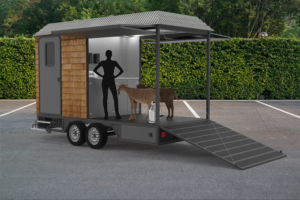Project Overview
Information Products
Commodities
- Animal Products: dairy
Practices
- Education and Training: demonstration, workshop, youth education
- Farm Business Management: agritourism, feasibility study, land access, new enterprise development
- Sustainable Communities: community services, new business opportunities, partnerships, urban agriculture
Summary:
Problem & Solution
Dairy farming is an expensive business to enter, especially without land or many resources. Sustainable dairy production, which utilizes nutritious pasture or wild forage for a majority of the animals' diet, requires even larger plots of land and a higher investment. Even so, it is challenging to make a profit, let alone a living wage from dairy farming. Creating a mobile milking parlor system is an answer to all of these problems, if you are willing to be creative.
A mobile milking parlor would open new land opportunities and income streams: for example, paid grazing projects or collaborations with other farmers, such as rotational grazing on cropland or cleaning up crop residues. It would also lend itself to teaching and demonstrations, the parlor creating a stage from which to share the milking experience and sustainable dairy methods. For a beginning farmer, it would allow her to make structural investments without being tied to a single property, or even move between leased plots. For a farmer looking to be both Grade A certified and pasture-raised, this would offer a certifiable milking system that could offer flexible milking for grazing animals.
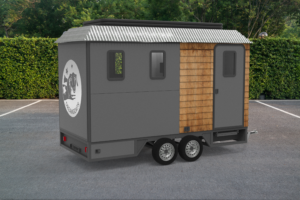 Other mobile parlor applications:
Other mobile parlor applications:
-
-
- Dairy farm expanding into land-clearing services
- Dairy farm expanding into land-clearing services
-
- Goat breeders putting on demonstrations at fairs/expos
- Goat Yoga / agritourism farm expanding offerings
- New farmer accessing free or shared land
- Goat farmer setting up a Grade A Raw Dairy on leased land
- School / 4H educator for training and teaching purposes
- Dairy educators using parlor to educate farmers about Grade A Raw Milk certification
Research Approach
The number of dairy goat herds has grown faster than any other livestock--63% from 2001-2017 (cow herds grew only 3%). In fact, every single state in the country increased in their dairy goat population during that time. Along with the growing demand for goat products, this increased interest in goat raising necessitates and more opportunities for young and new goat farmers to get started and produce income.
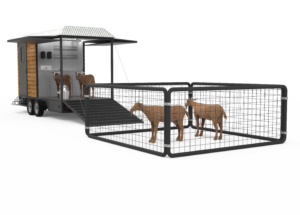 For this grant, I worked as a liaison between Michigan dairy inspectors and 2B Studio Inc, a local design firm, solving the legal and structural issues that arose during the parlor's design, including issues regarding separate entrances (there are three into the trailer), and a tested water source--water tanks are not sufficient to pass inspection. We had originally hoped to produce cheese or other milk products in this trailer, but we learned that pasteurizers must be immobile and the processing must be a separate building, disconnected from the milking area. We did not include bathroom, but there would have to be one nearby--as well as a tested water source hookup so the farmer could wash hands, equipment, and the parlor itself. As long as these limitations are understood and our design utilized, I am confident that our design could be Grade A Raw Dairy certified nationwide.
For this grant, I worked as a liaison between Michigan dairy inspectors and 2B Studio Inc, a local design firm, solving the legal and structural issues that arose during the parlor's design, including issues regarding separate entrances (there are three into the trailer), and a tested water source--water tanks are not sufficient to pass inspection. We had originally hoped to produce cheese or other milk products in this trailer, but we learned that pasteurizers must be immobile and the processing must be a separate building, disconnected from the milking area. We did not include bathroom, but there would have to be one nearby--as well as a tested water source hookup so the farmer could wash hands, equipment, and the parlor itself. As long as these limitations are understood and our design utilized, I am confident that our design could be Grade A Raw Dairy certified nationwide.
The rest of my work was outreach to farmers and the public. I wrote and produced a short video with the help of a videographer, to tell my story. I designed a website, and planned a webinar to share my results. A press release was sent to over one hundred reporters, and picked up by several media stations: radio, tv, print, and online. The webinar I hosted (also streamed on Facebook Live) and was promoted with a Facebook ad. I targeted farmers with specific interests and followed up on each of the 47 people who were interested in attending to ask for their email address. I also followed up with a pre-survey and a link to the video and final report after the event.
Research Conclusions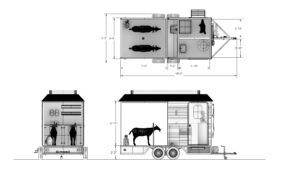
Our design is based on a 6'4"x18' HaulMark trailer and is split into three rooms: the parlor, the milk house with bulk tank, and the storage/washroom. It is designed to be self-sustaining, requiring only an input of tested water for washing and a small generator for power.
It is designed to operate under the Michigan Pasteurized Milk Ordinance, with washable walls, drainage in the floor, and a sink in each room for hand washing. The parlor room is designed to accommodate two full-size goats at once. The back of the trailer would fold down into a ramp and the sides fold up for viewing or down for warmth. The parlor area could also be used for transporting animals (up to 5-6 goats), if needed. There would be storage below, above, and on the back of the parlor for tools, equipment, and a temporary mobile corral. A 75-gallon gray water tank beneath the trailer would have to be dumped at a designated dumpsite, such as a campsite or food truck commissary. The parlor would have to be certified as a Grade A Dairy Farm, Grade A Raw Dairy, and Milk Hauler if the farmer planned to produce Grade A Raw Milk. Each farmer would have to work with their local dairy inspectors, so that random inspections could be made.
The cost of trailer and retrofitting is estimated at $25,000. Here's the breakdown:
- Trailer ($18,500)
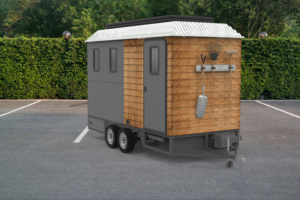
- Chassis
- Walls
- Doors
- Wiring, generator
- Lights
- Plumbing
- Hand sink / cabinets in parlor
- Corral ($500)
- Fence panels
- Anchor weights to support panels
- Three-room milking system
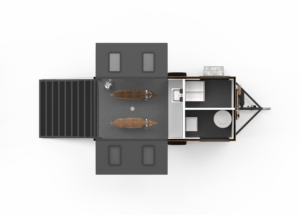
- Milking Parlor ($6000)
- Head lock with tray (2)
- Milk bucket assembly
- Vacuum pump
- Milkhouse
- Hand sink
- Cooling tank
- Storage cabinet
- Washroom & storage
- Two-compartment sink
- Storage cabinet
- Milking Parlor ($6000)
We wanted to design a compact, full-service parlor that could milk goats or sheep, cool milk, clean equipment, transport both animals and milk, and be useful for viewing and education. Our design can be submitted to your local HaulMark for trailer customization. The limitations of this parlor include that the water would have to be piped or delivered via hose from a tested water source to the location of your milking site.
In completing this design, we were left with ideas for so many different permutations but did not have the budget to see them through. One key idea would be to design a mobile parlor with farmstead creameries in mind. Most of the farmers I reached out to use their milk in house to create products, rather than selling to other producers. This design concept would include an expanded parlor area, no washroom, and likely no milk house. It would still include a gray-water tank, but tested water from the farmhouse or creamery could be used to wash down the parlor, so that the parlor could access further out pastures without having to be tied to clean water. The milk could be cooled in the parlor--or in the vat in the creamery. This idea is not fully explored, but I wanted to suggest it as a starting point for farmers interested in farmstead production.
If this parlor system were to be used for an unregulated herd share, a clean water tank could be installed atop the trailer, which would allow more flexibility as per milking location.
The milk produced in the parlor would have to be sold to a processor or modified on a farmstead facility. We assumed that the milk production would be able to cover the costs of the farming operation and that educational events would help the farm turn a profit. These educational events could be conducted 9 months of the year, and bring in $250 per visit, accruing at least $4000 per month in revenue with 4 visits per week for 8 months per year--$32,000/year. It is likely that most of these educational programs would have to be funded through area environmental or agricultural nonprofits or private places of learning.
Farmer Adoption
In order to see true adoption, this study would have to be expanded and lengthened. Since there is a growing market for goat cheese and goat milk, and a growing interest in raising goats, lowering barriers to entry is important. The Mobile Milk Parlor is one way to do that. Our January 30th presentation was attended by 40 people total, including farmers from North Central region: Michigan, Ohio, Illinois, South Dakota, Minnesota, and Missouri, as well as outside our region, including Pennsylvania, New York, New Hampshire, Kentucky, Georgia, North Carolina, Maryland, Vermont, Massachusetts, Texas, Washington, and Australia. Out of the folks that watched the seminar and completed the survey so far, fifteen had never heard or thought of the concept before and twelve had considered it before and had thought about potentially building one. Six of those twelve, who had thought about building one, hope to do so in the next few years. Farmers 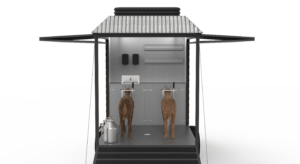 reported additional reasons for a mobile milking system, including space-saving and expanding land to rented pastures.
reported additional reasons for a mobile milking system, including space-saving and expanding land to rented pastures.
Beneficiary Outcome Story
This month I spoke with a farmer in southern Michigan who attended the workshop and is very interested in pursuing this project at her farm. She always planned to start a farmstead creamery making simple farmstead cheeses, and since she would have a bulk tank in her creamery, she was curious about using a smaller trailer and water access from the farm to clean the machinery and parlor. Her goats are raised on pasture in mobile huts, sometimes quite far from the barn, so she likes that she could drive out to them to milk.
Project objectives:
- Design Mobile Milkhouse Parlor for maximum effectiveness and education benefits
- We worked with MDARD Dairy Inspectors and 2B to create a realistic model
- 2B Studio created renderings for this model
- Engineer to be compliant with Michigan Dairy Laws
- We found ways to solve clean water access, engineering, and accommodating random inspections
- Requires parlor to be hooked up to tested water source & nearby bathroom
- Source and price materials, determine financial feasibility, costs and opportunities
- HaulMark created quote for the retrofitted parlor
- Priced out additional materials and equipment
- Created sample business financials to present at workshops
- Share findings with small ruminant farmers via social media, MFFS and Facebook Live.
- Created video to advertise
- Advertised using Facebook, press, social media, email
- Prepared webinar slides and conversation
- Followed up with attendees and prospective attendees with floor plan and information
